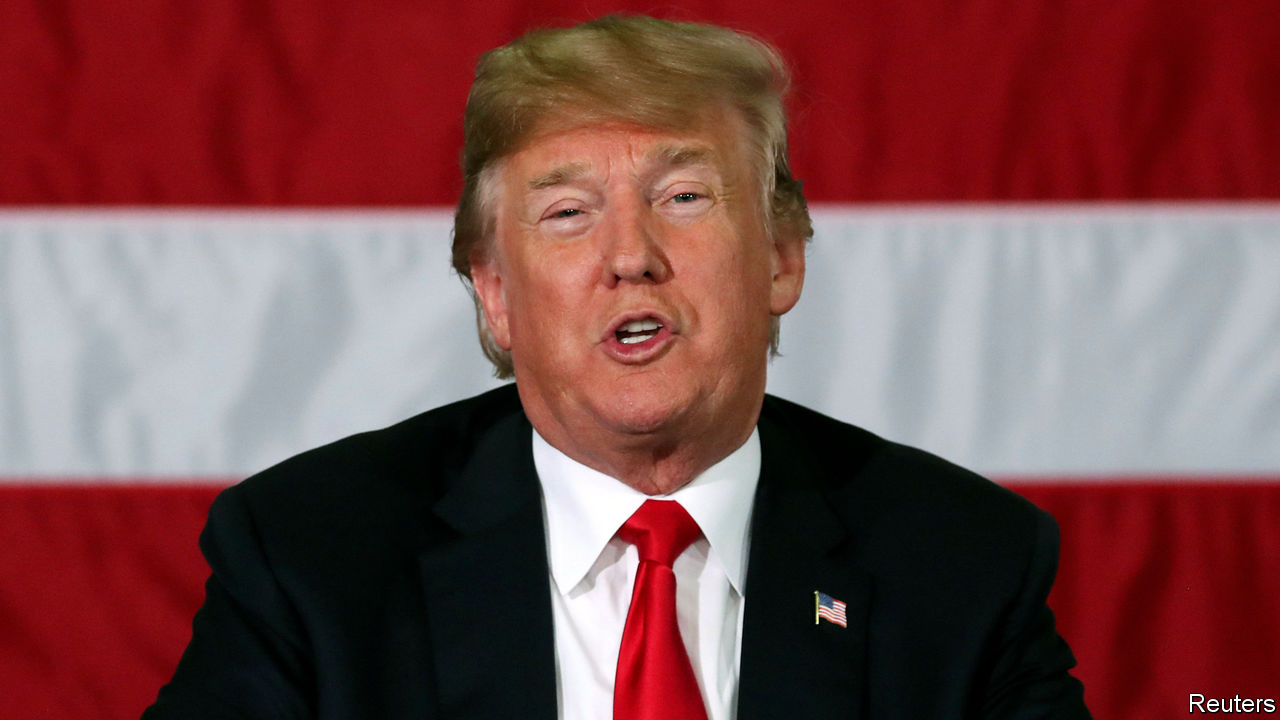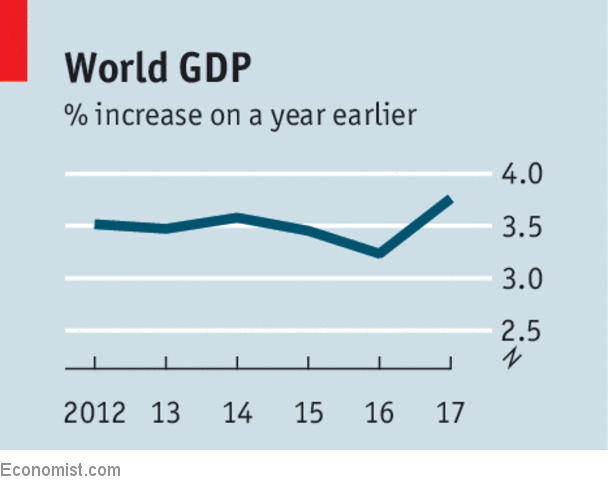Don’t crash it
Could a trade war derail global growth?
Rising tariffs are the worst of many threats to the world economy

LOOK at the headlines, and you would struggle to believe that the global economy is in good health. President Donald Trump continues to fire off volleys in his inchoate trade war, throwing financial markets into turmoil and drawing retaliation. The Federal Reserve is raising interest rates—an activity that usually ends in a recession in America. Tighter credit and a rising dollar are squeezing emerging markets, some of which, such as Argentina, are under severe stress.
Yet the world economy is thriving. Growth has slowed slightly since 2017, but still seems to be beating the languid pace set in the five years before that. America may even be speeding up, thanks to Mr Trump’s tax cuts and spending binge. A higher oil price, which in past economic cycles might have been a drag, is today spurring investment in the production of American shale. Some forecasts have growth exceeding 4% in the second quarter of 2018.
This sugar rush, however, brings dangers. The first is that it provides temporary political cover for Mr Trump’s recklessness. The second is that, if America accelerates and the rest of the world slows, widening differentials in interest rates would push up the dollar still more. That would worsen problems in emerging markets and further provoke Mr Trump by making it harder for him to achieve his goal of balanced trade.
The trade war is the biggest threat to global growth (see article). On June 15th the White House confirmed that a 25% tariff on up to $50bn of Chinese imports would soon go into effect. Three days later, after China promised to retaliate, the president expanded, by as much as $400bn, the other goods America is threatening to tax. If he follows through, nine-tenths of roughly $500bn-worth of goods imported from China each year will face American levies. Meanwhile, the European Union is poised to impose retaliatory tariffs in response to America’s action against EU steel and aluminium. No wonder markets have caught the jitters.
I’ll see you and erase you
The president is unafraid of escalating trade disputes because he believes he has a winning hand.
America buys from China almost four times as much as it sells there, limiting China’s ability to match tariffs. The White House hopes this imbalance will lead China to yield to its demands, some of which (cutting the theft of American firms’ intellectual property) are more reasonable than others (shrinking the bilateral trade deficit).

But Mr Trump overestimates his bargaining power. If China runs out of American goods to tax, it could raise existing tariffs higher. Or it could harass American firms operating in China.
More important, the president’s mercantilism blinds him to the damage he could inflict on America. He thinks it is better not to trade at all than to run a trade deficit. This folly also dictates his tactics towards Canada, Mexico and the EU. Mr Trump could yet withdraw from the North American Free-Trade Agreement and slap tariffs on cars.
The problem is not that America depends on trade. In fact, it is a big enough free-trade area for the eventual damage to GDP, even from a fully fledged trade war, to be limited to a few percentage points (smaller, specialised economies are more dependent on trade and would suffer a lot more). Such self-inflicted harm would impose a pointless cost on the average American household of perhaps thousands of dollars. That would be bad, but it would hardly be fatal.
The bigger issue is the vast disruption that would occur in the transition to more autarky. America’s economy is configured for designing iPhones, not assembling their components; the innards of its cars and planes cross national borders many times before the final product is ready. Faced with tariffs, firms have to redirect labour and capital to replace imports.
Some analysts attribute Mr Trump’s presidency to the economic shock from trade with China after 2000. The turmoil caused by reversing globalisation would be just as bad. One estimate puts American job losses from a trade war at 550,000. The hit to China would also be severe. Any adjustment would be prolonged by Mr Trump’s unpredictability. Without knowing whether tariffs might rise or fall, what company would think it wise to invest in a new supply chain?
It is difficult to imagine such a realignment without a global recession. Tariffs temporarily push up inflation, making it harder for central banks to cushion the blow. The flight to safety accompanying any global downturn would keep the dollar strong, even as America’s fiscal stimulus peters out after 2019.
So be wary. The trade war may yet be contained, to the benefit of the world economy. But America is the engine of global growth. In Mr Trump, a dangerous driver is at the wheel.
0 comments:
Publicar un comentario